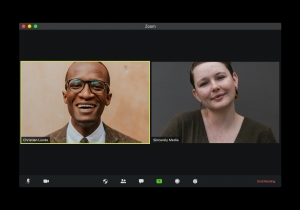Date: February 2020
Client: Corbenic Camphill Community
Project: Recruitment of Multiple, Cross Divisional Roles
A client who Jenson Fisher have recruited for previously has an employee that sits on the Board of Trustees of Corbenic Camphill Community (Corbenic), a registered charity supporting adults in need of specialist care. It had come to light that Corbenic were going to be recruiting for a Finance Manager and a recommendation was made that the services of Jenson Fisher be considered. Upon meeting with the General Manager for the site and discussing not only our Accountancy & Finance division but also our Office Support offering it was identified that there were in actual fact a number of key positions to be hired where Jenson Fisher could assist.
Due to a period of sustained growth, alongside a significant investment towards enhancing capabilities, the additional roles required to be filled were a HR Manager (Permanent) and a Fundraising Officer (24 Month Fixed Term Contract). Corbenic were attracted to having one point of contact for this project and as such engaged Jenson Fisher on a retained basis for all three roles enabling us to work as an extension of their organisation, approach the market with complete confidence and spearhead a national advertising campaign designed at attracting individuals who had relevant experience but, critically, a specialist understanding of the third sector.
Recruitment of Finance Manager
Alongside identifying a shortlist of candidates with charitable experience, two key challenges when recruiting the Finance Manager position were a) the location of the organisation and b) remuneration available. Whilst Corbenic were paying a competitive rate for the Perthshire area, the commute to North Perthshire is not overwhelmingly popular and historically this has been a stumbling block when recruiting in this part of the world. In this instance Corbenic were able to offer flexible working to suit the individual which went some way to bridging any gaps.
A shortlist was built as a result of the advertising campaign, our existing CRM system, our tertiary network of passive candidates and our ability to seek referrals from respected sources. As a result we were able to run a straightforward interview process and reach a conclusion where any one of a number of candidates proposed could have been offered the role. This was the first Finance Manager that Corbenic had hired for their Trochry site and one that we at Jenson Fisher were delighted to support with.
Recruitment of HR Manager
Due to the growth in terms of people, it was key for Corbenic to introduce a HR Manager to manage all personnel related issues across the site. The Head of our Office Support division has significant experience recruiting HR professionals at all levels for clients across both the private and public sector and as a result was able to approach her network, lead a dynamic marketing campaign and present a shortlist of candidates who all had significant value to bring to the organisation at Corbenic.
The same challenges were faced as were encountered with the Finance Manager position however Corbenic displayed an excellent approach to flexibility surrounding working hours and locations and as a result we were able to work together to ensure that a fantastic candidate was hired into this key role.
Recruitment of Fund Raising Officer
Corbenic were at the early stages of a proposed £2m expansion to their site in Perthshire and it had been identified that a Fund Raising Officer was required to lead and manage the internal fund generation element of this project. To say that this was a niche role would be putting it lightly and the challenges encountered for the Finance and HR positions were dwarfed by the reduction in candidate pool in terms of the experience required alongside the fact that this position was fixed term in nature.
As we were working with Corbenic on a retained basis we were satisfied investing considerable amounts of our time working towards a satisfactory conclusion for all.
The strength of our multi-divisional structure and consultative approach ensured that we at Jenson Fisher were comfortably able to provide an unrivalled service to our client and the end result for Corbenic demonstrated our ability to not only understand what our client required but also our ability to select market-leading employees across a variety of disciplines.
Not in the last century have we experienced anything remotely close to the Covid-19 crisis. What began as a health crisis now appears to be a full-blown economic catastrophe. As the first wave of the virus passes, we have to start looking at some of the economic impacts this crisis will have in Scotland.
We already know that everyone will be affected in one way or the other; what we do not know, however, is how much it will affect each individual.
First of all, families across Scotland are experiencing financial insecurity. People’s health are threatened while going to work has become difficult. Freelancers, self-employed people, and those reliant on statutory sick pay are affected as well. People are losing their jobs, having their work hours reduced, and feeling the heat already.
According to a recent survey by Standard Life Foundation, one out of every two UK households are worried about their finances. With huge parts of the economy being decimated, their worries are justified.
The UK government’s Jobs Retention Scheme offered encouragement last month when it paid 80 percent of wages across different industries. With payment also coming this month, employers and families under pressure have been able to breathe easy for a while.
Inside 48 hours of the scheme opening, employers made 2.2 million applications, while the total number of employees enjoying the scheme is bound to reach 8 million within the month. There are fears of a significant drop in earnings for 40% of applicants if numbers continue to rise.
Increased furlough and unemployment in Scotland
It is anticipated that over the next few months, an estimated 750,000 employees in Scotland will be enrolled on the Jobs Retention Scheme, while at least 150,000 jobs are anticipated to be lost. These numbers are not expected to be even across Scotland since different sectors face varying prospects. It is expected that Scotland’s lowest-paying sectors suffer the most.
In the retail and wholesale sector, an estimated 31,500 jobs should be lost, with 142,000 workers put on furlough. In the food and accommodation sector, an estimated 31,000 jobs should be lost, with 140,000 workers put on furlough. In the healthcare sector, however, no job losses are anticipated, with an estimated 14,000 jobs to be created.
The hospitality and tourism sector is not spared. At least 8 out of 10 employees are expected to lose their jobs or enter furlough. For workers in this sector, as well as of those in the food and accommodation services, a 20 percent pay cut will be gruesome.
Employees in the retail sector are at relative risk, even though their jobs are not secure. One out of two employees is still expected to be affected by job loss or furlough. While, the insurance and finance sectors, where employees are paid higher appear to be well insulated from the economic fall-out of the coronavirus.
What these statistics simply show, is that workers in Scotland and the UK at large with higher earnings and greater security will not suffer as much as those in the lower-paying sectors.
Financial security going into the crisis
According to statistics, one in three workers in the hospitality and tourism sector said they were under immense financial pressure; for workers in the construction sector, it is nearly one in three.
Individuals that are already struggling with financial insecurity with the ongoing crisis dread the possibilities of having their earnings cut or losing their jobs. With the rising costs of energy and food bills and an increased risk of illness adding a strain on families, the mounting pressure on workers is understandable.
The aftermath of the impending furloughs
There is a growing fear that after the withdrawal of the emergency support, and the end of all furlough schemes, a huge number of workers experiencing furlough may be redundant. This means that a mini crisis in household finances is brewing.
How the UK and Scottish government handles this crisis will be of particular interest going forward, even as it threatens to blow over.
The dream will be to see significant support continue to protect sectors and households across Scotland from extreme hardship and financial insecurity when the emergency support ends.
The general belief is that, before the crisis, the UK government erred when they pushed the risk onto those who could least bear it. The consequences have been exposed by the crisis. With focus turning towards the economic burden of the crisis, pressure has to be put on the UK government, for the provision of adequate safety measures.
The recent doubling of the Scottish Welfare Fund is a welcome sign, while inside the coming weeks, Westminster and Holyrood government will need to make fast decisions to strengthen financial security to prevent some of the UK and Scotland’s households entering into depression.
Firms have to tackle skills shortage by looking into hiring policies and consider flexible working. Jenson Fisher are encouraged leaders in the accountancy industry to use the possible recovery from the recent pandemic as an opportunity to resolve overdue issues in the industry.
Before the impact of the coronavirus on the economy, the fact newly qualified practitioners were able to earn more than the £40,000 average salary for the first time proved that accountants in Scotland were becoming scarce. This is not withstanding the fact experienced operators took home six-figure salaries.
Jenson Fisher issued a warning in its April newsletter, saying that underlying issues were bound to hit the accountancy industry. The article pointed out the potential of these underlying issues intensifying over the coming months as a result of the fallout and trauma caused by the pandemic.
A lack of succession planning, is one of the underlying issues highlighted, with possibilities of a lack of middle management, which could result from swinging cuts to graduate placement opportunities relating to the 2008 recession.
The outbreak is devastating so many businesses and livelihoods and we hope we can all get through this in the healthiest possible position. That said, accountants in Scotland, on the whole, should find themselves in a better position than many trades. It's hard to think there won't still be excess demand for roles, such was the prevailing shortfall.
We hope that firms also think thoroughly before cutting either middle management or graduate schemes off the back of the impending downturn, as happened throughout the last recession, which has now filtered through today with the reduced pipeline of clear future leaders. It is important that we attract more accountancy and finance professionals into the sector for the future of this essential industry.
Prior to the coronavirus outbreak, firms talked a lot about their commitment to flexible working and being willing and able to cater for a modern workforce, but there is much evidence to suggest this wasn’t actually being actioned.
Was this a staff trust issue, or resistance to change from a ‘old school’ work ethic, maybe, but now organisations have been forced to have our entire workforces work from home and recognise that the outputs did not drop, technology is available to manage staff and workflow and it is potentially extremely cost effect.
The questions are, will this be reflected in major changes to workplace culture once we have the ability to safely return to office environments? Will we even rush back to our offices at all?
So many practitioners are also juggling childcare and home-schooling and childcare to meet the needs to work at different hours. More than ever before, workplaces are going to have to prove to many seeking a career move that they can be an attractive, flexible employer able to cater those wishing to work from home.
Another trend that was seen was the number of candidates ready to move to smaller companies. We expect to see a large amount of restructuring, redundancies, mergers and acquisitions which has meant that big organisations have lost some of their attraction. They were always seen as a safe bet, able to offer a clear path to progression, however, there has been an interest in start-ups, fintech and the opportunity to be more entrepreneurial. It'll be interesting to see whether this trend increases or abates following the Covid-19 fallout.
Date: February 2020
Client: Horsecross Arts Ltd
Project: Recruitment of Head of Finance & Administration
In February of 2020 Jenson Fisher alongside a number of other search and selection firms from across Scotland were approached by Horsecross Arts Ltd, a high profile organisation under public scrutiny, to discuss the recruitment of a new Head of Finance. Upon meeting with the Chief Executive and discussing not only the Jenson Fisher methodology but also our proven track record hiring similar positions we were subsequently awarded the business.
In this instance, Horsecross Arts Ltd were in the process of emerging from a period of significant turmoil, financial mismanagement and changes at board level including the appointment of a new Chief Executive to spearhead the change in fortunes. It was essential, at this point, that we maintained constant communication with the client and had a full understanding of the organisation’s position in order to maintain a consistent and transparent brief with all individuals concerned.
Recruitment of Head of Finance & Administration
This position was handled by one of our Partners and, in agreement with our client, we adopted a multi-faceted approach from the off which comprised of a national, full-scale advertising campaign (maximising the attraction of both the Horsecross and Jenson Fisher brands) a thorough market research resulting in a longlist of candidates with crucial sector-specific experience and the use of our own state of the art CRM system, existing candidate database and existing candidate networks alongside a direct headhunt of passive individuals to generate interest and potential referrals.
The timeframe agreed with the client was 3 weeks from engagement to shortlist which presented its’ own challenges however with the correct approach, time and dedication we were able to perform the shortlisting process within this time. This included meeting all potentially suitable candidates, fully briefing them on Horsecross as an organisation and discussing frankly with them the challenges previously faced whilst also highlighting the opportunity that this subsequently provided for the successful candidate. Additionally, this provided us with the opportunity to pre-screen each individual and probe further around technical and personal competencies. Our initial objective was to provide a shortlist of 5 individuals who met the criteria required, the shortlisting process itself generated over 100 potential candidates with over 25% being met and further qualified.
At this point, the shortlist was submitted to the Chief Executive and a meeting took place to discuss their thoughts and feedback and also our reasons for shortlisting for the position. Each candidate had a CV professionally prepare by Jenson Fisher written in a consistent format containing consultant notes and also highlighting clearly areas of particular relevance. At this point interviews were confirmed for all candidates and the structure of how this would work was agreed in terms of interview dates, second interviews and structure of feedback. At this point we also confirmed expected remunerations for all candidates to avoid any issues or concerns later in the process.
Uniquely, for this role, upon completion of the first interviews our client felt that there was one candidate who stood out as being absolutely perfect for the position. Given the urgent need for the new Head of Finance to join the organisation, and to avoid potentially losing the candidate to another opportunity, the decision was made to offer at this point which, given the work undertaken thus far, was smooth and straightforward.
The offer was made in advance of the Covid-19 outbreak and as a result the individual concerned was able to start, albeit remotely, during the lockdown period. This in itself presented a unique challenge to both the candidate and the client and also to Jenson Fisher. However, maintaining regular communication with all parties and structuring as straightforward an induction period as possible ensured that there were no hiccups and all parties were delighted with the outcome.
The Head of Finance & Administration position with Horsecross Arts Ltd is one of, if not the, highest profile finance positions in the Perthshire area. At Jenson Fisher, we were able to confidently support here given our commitment and experience to the Accountancy & Finance sector, our specialist experience and unrivalled network of candidates. Like all of our divisions, we have a far stronger fill rate than direct advertising and aim to take the pain out of any recruitment process.
VIDEO INTERVIEW TIPS
Innovations in Recruitment
First, it was China, then the world and most of its activities were brought to a halt due to the deadly covid-19 virus. Businesses have been placed on hold globally, and only a few are surviving by adapting to a more remote working policy. Talk about recruiting; no one is hiring at the moment, at least not until the government lifts the lid on social distancing. However, the few who can recruit as per a remote working basis are doing so through phone calls and video interviews. If you are like 95% of job seekers out there, it is most likely that you have never experienced a telephone or video interview.
With that in mind, we have prepared this guide to help get your video interview and telephone skills up to scratch, so that you can successfully stay ahead of the curve and land your dream job even in this pandemic.
Read on to discover some of our helpful tips on how to ace a video interview.
How does a video interview differ from one-on-one interviews?
Do not be deceived; holding a video interview is quite different from a one-on-one meeting. What your recruiter pays attention to during a one-on-one conversation is quite different from what the same person will pay attention to when conducting a video interview. If you are applying for any position at all in this pandemic, you will most likely have to undergo a video or telephone interview as part of your recruitment process. Do not be alarmed because the secrets we are about to reveal to you in the following sections will ensure you are well prepared.
During recruitment processes in times like this, video interviews are often conducted at the very beginning. Why is that?
There are many reasons why an organization would want to conduct a video interview first, but we will delve into the most obvious ones. It helps to filter out unserious candidates, thereby saving the company both money and valuable time to focus on more serious options. Another reason is that it presents the interviewer with an opportunity to go over the interviews multiple times and pick up qualities from candidates that will be beneficial to the specific role that they applied for, rather than relying solely on qualities mentioned on CV or notes taken.
What problems could you possibly encounter during my video interview?
There is the issue of what format your video interview will take. Making a pre-recorded video and sending it to your interviewer is quite different from conducting a live video interview. Not everyone can comfortably sit in front of a camera and record a session, not to mention holding a live meeting. Plus, there is the issue of network connectivity and time lapses that may cause problems. However, with a little practice using the instructions from our guide, you can easily overcome most of these challenges and successfully move on to the next stage of your interview process.
How do you ace your video interview?
- Research the format
It will give you an edge to know beforehand what format your video interview will take so you can start practicing on time because both live and pre-recorded videos present their very own unique experiences and challenges. Let's take a more in-depth survey into both formats to understand what you need to ace them.
Live - With the pandemic and social distancing in place, recruiters are switching over to live video interviews to recreate the traditional interview system of one-on-one conversation, only that this time, the discussion is held over the internet through video conferencing apps like skype. With live video interviews, you speak with your interviewer (s) in real-time, like you would if you had visited their office in person. You need to treat your conversation with the interviewer with all seriousness and concentration as you would if you had the interview in their office in person. Pay attention to details, create a rapport, and don't forget to mention specific areas where your skillset has made your past employees better.
Pre-recorded - This is a less intense form of video interview than live video because you are not required to have a conversation with your interviewer. Still, this can prove to be quite a hurdle, especially if you are someone without video recording skills.
In a pre-recorded video interview, you are presented with a format or set of questions that you need to attend to with your video-often at a limited timeframe.
The good news here is that you can pre-record as many videos as you like to help sharpen your skills, provided that you are still on track with the deadline given. Practicing is critical because your competitors are also afforded the same luxury of pre-recording as many videos as they can, and selecting only the best for submission. If it helps, you can get someone knowledgeable about video interviews to help you analyze all of your pre-recorded videos and choose the best or point out areas where you need improvement.
- Choose your location
Because you are not present in person for the interviewer to properly analyse, part of his attention will be drawn to your environment, and that is normal, which is why you can not afford to use just any background during the interview process. For a start, select a serene location, make sure that it is neat and free from distractions so that you will be the sole focus of the interviewer.
Also, you need to pay attention to your lighting. You don't want to be in an interview where your interviewer can barely see your face or attire. Make sure to use natural light for the best possible results. If you are recording with your phone, be sure to silent all notifications that may pop up during the interview process.
- Dress appropriately
Forget the fact that it is an online interview; you still need to show up with the charisma that you would for a one-on-one interview. Select the best outfit that you would have worn if you had this interview in your employer's office. If you have issues selecting the best formal outfit, seek help, it will do you more good than harm to leave a good first impression with any means necessary.
- Use positive body language.
Moving around during a video interview is unacceptable, no matter the consequences. Avoid moving around unnecessarily unless you need to demonstrate a scenario to your interviewer. Always sit upright, avoid slouching, and maintain eye contact by looking directly at your camera and not the screen. Make sure to use a suitable audio device so that you won't have to keep asking your interviewer to repeat what they just said, pay attention to details, and do your best to get clarification on concepts that sound confusing to you. Don't assume, always ask when a question or statement seems confusing to you. That way, you avoid giving wrong answers that will kill your chances of landing the job.
If you are doing a pre-recorded video, it can be easy to lose enthusiasm and start speaking casually because you won't be talking directly with anyone. But that should not be the case. It would be best if you spoke with the same clarity and vigour that you would have if the interview were in-person. That way, your interviewer can easily match your intentions and qualities to determine if you are a good fit.
- Get technical
Technical issues can kill all of your hard work, and that is why you need to be at the top of your game to avert glitches that may ruin your chances of landing that job. A good rule would be to test-run all devices, networks, and programs involved days and hours before the interview to ensure that they are all in the right conditions. You don't want to be abruptly cut out from your interview because of technical glitches that could have been avoided, especially for live video interviews.
Few hours before your interview, make sure that all the devices you need are fully charged and last you throughout the interview process. If there is any chance that your batteries won't last that long, I suggest you leave it plugged to a power supply until the interview is over. Every sign in process and setups should be completed at least 30 minutes before the meeting to avoid lateness. It shows punctuality and gives an excellent first impression.
If you are asked to do a pre-recorded interview, it will help to know beforehand if you are allowed to restart a particular recording if you start experiencing technical difficulties.
VIDEO INTERVIEW TIPS
Innovations in Recruitment
First, it was China, then the world and most of its activities were brought to a halt due to the deadly covid-19 virus. Businesses have been placed on hold globally, and only a few are surviving by adapting to a more remote working policy. Talk about recruiting; no one is hiring at the moment, at least not until the government lifts the lid on social distancing. However, the few who can recruit as per a remote working basis are doing so through phone calls and video interviews. If you are like 95% of job seekers out there, it is most likely that you have never experienced a telephone or video interview.
With that in mind, we have prepared this guide to help get your video interview and telephone skills up to scratch, so that you can successfully stay ahead of the curve and land your dream job even in this pandemic.
Read on to discover some of our helpful tips on how to ace a video interview.
How does a video interview differ from one-on-one interviews?
Do not be deceived; holding a video interview is quite different from a one-on-one meeting. What your recruiter pays attention to during a one-on-one conversation is quite different from what the same person will pay attention to when conducting a video interview. If you are applying for any position at all in this pandemic, you will most likely have to undergo a video or telephone interview as part of your recruitment process. Do not be alarmed because the secrets we are about to reveal to you in the following sections will ensure you are well prepared.
During recruitment processes in times like this, video interviews are often conducted at the very beginning. Why is that?
There are many reasons why an organization would want to conduct a video interview first, but we will delve into the most obvious ones. It helps to filter out unserious candidates, thereby saving the company both money and valuable time to focus on more serious options. Another reason is that it presents the interviewer with an opportunity to go over the interviews multiple times and pick up qualities from candidates that will be beneficial to the specific role that they applied for, rather than relying solely on qualities mentioned on CV or notes taken.
What problems could you possibly encounter during my video interview?
There is the issue of what format your video interview will take. Making a pre-recorded video and sending it to your interviewer is quite different from conducting a live video interview. Not everyone can comfortably sit in front of a camera and record a session, not to mention holding a live meeting. Plus, there is the issue of network connectivity and time lapses that may cause problems. However, with a little practice using the instructions from our guide, you can easily overcome most of these challenges and successfully move on to the next stage of your interview process.
How do you ace your video interview?
- Research the format
It will give you an edge to know beforehand what format your video interview will take so you can start practicing on time because both live and pre-recorded videos present their very own unique experiences and challenges. Let's take a more in-depth survey into both formats to understand what you need to ace them.
Live - With the pandemic and social distancing in place, recruiters are switching over to live video interviews to recreate the traditional interview system of one-on-one conversation, only that this time, the discussion is held over the internet through video conferencing apps like skype. With live video interviews, you speak with your interviewer (s) in real-time, like you would if you had visited their office in person. You need to treat your conversation with the interviewer with all seriousness and concentration as you would if you had the interview in their office in person. Pay attention to details, create a rapport, and don't forget to mention specific areas where your skillset has made your past employees better.
Pre-recorded - This is a less intense form of video interview than live video because you are not required to have a conversation with your interviewer. Still, this can prove to be quite a hurdle, especially if you are someone without video recording skills.
In a pre-recorded video interview, you are presented with a format or set of questions that you need to attend to with your video-often at a limited timeframe.
The good news here is that you can pre-record as many videos as you like to help sharpen your skills, provided that you are still on track with the deadline given. Practicing is critical because your competitors are also afforded the same luxury of pre-recording as many videos as they can, and selecting only the best for submission. If it helps, you can get someone knowledgeable about video interviews to help you analyze all of your pre-recorded videos and choose the best or point out areas where you need improvement.
- Choose your location
Because you are not present in person for the interviewer to properly analyse, part of his attention will be drawn to your environment, and that is normal, which is why you can not afford to use just any background during the interview process. For a start, select a serene location, make sure that it is neat and free from distractions so that you will be the sole focus of the interviewer.
Also, you need to pay attention to your lighting. You don't want to be in an interview where your interviewer can barely see your face or attire. Make sure to use natural light for the best possible results. If you are recording with your phone, be sure to silent all notifications that may pop up during the interview process.
- Dress appropriately
Forget the fact that it is an online interview; you still need to show up with the charisma that you would for a one-on-one interview. Select the best outfit that you would have worn if you had this interview in your employer's office. If you have issues selecting the best formal outfit, seek help, it will do you more good than harm to leave a good first impression with any means necessary.
- Use positive body language.
Moving around during a video interview is unacceptable, no matter the consequences. Avoid moving around unnecessarily unless you need to demonstrate a scenario to your interviewer. Always sit upright, avoid slouching, and maintain eye contact by looking directly at your camera and not the screen. Make sure to use a suitable audio device so that you won't have to keep asking your interviewer to repeat what they just said, pay attention to details, and do your best to get clarification on concepts that sound confusing to you. Don't assume, always ask when a question or statement seems confusing to you. That way, you avoid giving wrong answers that will kill your chances of landing the job.
If you are doing a pre-recorded video, it can be easy to lose enthusiasm and start speaking casually because you won't be talking directly with anyone. But that should not be the case. It would be best if you spoke with the same clarity and vigour that you would have if the interview were in-person. That way, your interviewer can easily match your intentions and qualities to determine if you are a good fit.
- Get technical
Technical issues can kill all of your hard work, and that is why you need to be at the top of your game to avert glitches that may ruin your chances of landing that job. A good rule would be to test-run all devices, networks, and programs involved days and hours before the interview to ensure that they are all in the right conditions. You don't want to be abruptly cut out from your interview because of technical glitches that could have been avoided, especially for live video interviews.
Few hours before your interview, make sure that all the devices you need are fully charged and last you throughout the interview process. If there is any chance that your batteries won't last that long, I suggest you leave it plugged to a power supply until the interview is over. Every sign in process and setups should be completed at least 30 minutes before the meeting to avoid lateness. It shows punctuality and gives an excellent first impression.
If you are asked to do a pre-recorded interview, it will help to know beforehand if you are allowed to restart a particular recording if you start experiencing technical difficulties.
Project: Creation Of Auto Enrolment Team/Department – 21 roles
Client: Mid Sized Employee Benefits Consultancy (FTE : 70 employees)
P&C Available on request
Timeframe: 12 Weeks
Jenson Fisher were retaining by a mid-sized EBC to recruit the entire division for a newly created Auto Enrolment department, from top to bottom. The organisation created their own product for the market, which was designed, implemented and managed by the new division. Jenson Fisher were awarded this project due to its position in the recruitment market within the Pensions industry, the client needed to have a partner who knew the market, but could also carry out the recruitment professionally and represent them accurately. This was a key expansion growth for the client which was of high cost in relation to company size and core to their development.
We as a company always ensure we work closely with the client to gain full understanding of the remit, structure, environment, position and focus of the role, this enables us to fully understand the requirement.
We had a time frame of 12 weeks for all roles
The Remit:
• 8 x Business Development Managers nationwide
• Compliance Manager with G60
• Admin Manager
• Financial Controller- FS Background
• Marketing Head- Auto Enrolment
• Head Of Digital Marketing - Auto Enrolment
• 4 x Implementation Consultants - Auto Enrolment
• 4 X Pension Administrators
Business Development Managers
Two consultants focused on the remit, we commenced by identifying potential candidates through researching the market, networking, using online tools to create a list of approachable individuals based on the given criteria from the client. We also discreetly advertised the role but we generally find searching the passive market is hugely more successful for the more senior roles and a mixture of advertising and targeting the passive massive gives success in the more common roles.
We had a time frame of 12 weeks for all roles, due to our links into the market with advisors and distributors along with our tools aligned for research in this market , gained through many years’ experience, we worked each region, approaching the targeted individuals until we had a minimum of 3 candidates appropriate for the roles, based on the criteria and vetted further through conversation and questioning through our knowledge. Ensuring they did not only have the relevant experience but the personality and drive to suit the clients' needs.
We needed to identify and then target companies on the EB market in all guises who may have experience in the AE market- providers, distributors, specialist software providers and even accountants for the Business Development Managers, preferably with good contacts in the IFA/EB space where they can sign them up to use the product, others were going direct to market so we had to find a mixture of the two but both capable of presenting and selling with a strong knowledge of AE and its mechanics.
We also advertised in each region, in specific, industry publications such as professional pensions and Pension careers. The main success came from direct approaches and names on our database, but we did have limited success through advertising.
Head of Digital Marketing and Financial Controller
We used a more targeted strategy as there were many FS companies around the region, we did advertise but had no success. Again we targeted relevant companies in a discreet manner to identify and discuss the opportunity, identified the most suitable candidates and presented the best 3 for each role
Admin Manager, Implementation Consultants , Administrators
For these roles, it was more role reversal, we had success through advertising and very limited direct approaches required more towards the latter end of the recruitment when 1/2 roles remained. It was a different process this time, we had to vet the cv’s which were numerous, conduct a lot more vetting phone calls for all the cv’s we received to determine the most suitable. Using our knowledge of the client and our formulated key skills document for the roles, we created our shortlists. Only latterly did we have to go and "find" other candidates from our resources.
The client had requested that we set up an interview date in each region for the Business Development managers as these were nationwide, the remainder of the roles were in South London at their head office where there was more flexibility in times/dates for interview.
All roles required experience in Financial Services and more importantly Auto Enrolment, so we had to be very specific in our search and questioning to each candidate on their experience to date and technical knowledge of Auto Enrolment.
For each role and each candidate found, we conducted a thorough phone or personal interview based on the criteria for the specific role and suitability for the client. Once we were satisfied with the candidate's suitability, we then added them to the shortlist for the appropriate role before finally presenting them in sets for each role.
Throughout the interview process, we constantly managed the process, identifying any potential issues as early as possible to manage expectations for both parties and ensure an efficient process and high success rate in interviews held to job offers.
Result
Jenson Fisher we managed the offer process, resignation process and recruited all 21 roles within the 12 week time frame, and gave post placement follow up to both clients and candidates.
TIME TO REFRESH YOUR CV
Unfortunately due to current events it may be essential for you to get your CV up to date. Even more so, it is important to make yourself stand out so you can rise above the rest. Therefore, before you begin looking for suitable positions, it is important to optimise your CV.
Statistics show that recruiters take an average of 6 seconds to look over your CV before evaluating that they want to proceed. Making sure your top skills and experience shines is key to grabbing the eye of your next potential employer.
Formatting Your Content
When updating a CV, many candidates focus too much on their current experience rather than ensuring the rest of the document is still fit for purpose. The last thing you need is too much unnecessary information reducing the chances of your CV being selected. It is recommended to keep the length of it to 1 or 2 pages.
By providing information to recruiters that is clear and concise it will help improve your chances of being selected. Only provide details for the last 10 years’ worth of experience, anything longer is more than likely not relevant and is either picked up in your skill set from recent roles or not essential.
A CV is a sales pitch, showing all that you can bring to the table. Don’t be afraid to really put yourself forward by highlighting what you excel at. Recruiters like confidence, so let it shine throughout your profile.
In addition to a well worded CV, the layout can be just as crucial. A bad design will cause it to be discarded straight away. Avoid using any symbols or graphics and stick to a basic font only. The layout should consist of 3 main sections - Summary, Experience, and Education.
Think Of Real Examples That Link To Your CV
Ensure all skills and experience come with real examples when questioned. During an interview the hiring manager will pick up on different parts of your CV and get you to discuss them. By knowing how to elaborate when questioned, will allow for a much smoother experience during the interview.
Highlighting Relevant Content
Make sure to provide the correct experience and skills recruiters want to see for the role they are looking to fill. Updating your profile will details, skills, and trends relating to the industry could set you above the others. For example, if you’ve recently completed a training course that covers many topics of a certain role, this should be added.
Technology has rapidly changed the recruitment world. With hundreds of different platforms to search from, it is not always easy to find the best one for you. By focusing all your energy searching for positions on a site that may be too saturated will most likely lead you to becoming frustrated and unnecessarily wasting your time.
The information below helps categorise each benefit gained from being represented by a consultant
Recruitment Consultants Relationships With Hiring Managers
Recruitment consultancy firms are on the rise, with both companies and candidates looking to them to find the perfect fit. In recent years the mentality has changed from just filling roles to finding great candidates that will truly benefit the company.
This approach helps keep employees in long lasting positions which they enjoy, and reduces training costs for organisations. Therefore, hiring managers will connect with previously used consultants if they have provided well-suited candidates in the past. So if you are already registered with a particular agency and a great position comes along, you will be one step ahead of the competition.
Letting Someone Else Do All The Heavy Lifting For You
Life can be busy, you may have other commitments and not be able to apply for positions as frequently as you want to. With a recruitment consultant they can actively look for roles without you lifting a finger after a few simple steps. All that is required is to fill out some initial forms and have a one time interview to allow the consultant to get a feel of the best jobs you would be suited for.
There are many recruitment websites out there and it can be confusing which is best for what you require. A consultant is used to working long hours to sieve through all networks to locate the best jobs available.
Finding The Position Where You Can Prosper
The majority of recruitment consultants take pride in really understanding HR managers and candidate’s needs. Each candidate is listened to carefully, to gauge multiple different factors. This includes getting to know their personality to see if it relates to a particular company culture. Furthermore, by understanding your goals and aspirations, for example if you’re strongly looking for internal career progression, a consultant will take this into consideration to find an organisation
that is known to offer this factor. Candidates will no longer be overloaded with emails for roles that do not match their close specification, saving a considerable amount of time.
Putting You Into The Spotlight
Consultants will gain greater knowledge of you, beyond just looking at a CV. With all this additional information they can pitch you in high-regards to hiring managers to allow you stand out from the crowd. This includes aspects that aren’t necessarily mentioned in the job description but would greatly benefit the company, such as work ethic, people skills, attendance and much more.
Understanding Where You Stand In The Market
It can sometimes be difficult to know what type of salary and benefit package you could ask for to stay competitive and not dissuade potential employers. If you pitch yourself too low, you could miss an opportunity to sell your skills for what they are really worth. Finding the sweet spot of not underselling yourself or pricing yourself too high can be hard.
This is where a recruitment consultant comes in. They are experts that usually focus on a certain field so know exactly what you should be asking for. Therefore, when negotiating with an hiring manager for the salary expectations you want, you will feel more confident and be one step closer to securing that position you desire.
Enhancing your interview skills
Interviews can be somewhat nerve racking for a lot of candidates. Helping you prepare for one is essential for showing an employer all you have to offer. To help you practice, a recruitment consultant will be there to provide fake telephone and face to face interviews to improve your interviewing skills to exactly what the hiring firm is looking to see.
The recruitment process usually consists of two face to face interviews. The first will consist of general information about yourself and your previous employment history. Secondly, the next interview will be more in depth and will require great knowledge of what you will bring to the organisation. Knowing the type of questions that will be thrown your way is crucial to prepare your reply.
Insight Into the Market
A great relationship with a consultant can provide broader knowledge of the market you are applying in. Whether that be changes in salary expectations or sought after skills, there are many advantages to this professional relationship.
If the consultant has previously worked with a company by supplying them with suitable candidates, more than likely they understand the company’s specific requirements. This information provides further insight to knowing if the role is right.
Expect Support Until You are Hired
Consultants are only paid for their services once the candidate has been offered and accepted the role. This means throughout the process the recruitment consultant is focused on providing continuous support and necessary resources until you are happily working in your dream job.
Deciding to change jobs can be a hard decision for a lot of people. If you have decided to take the jump into uncharted waters leading to applying for positions in other companies, there is more than likely an important reason. By going through the process of attending many different interviews to find one that meets your requirements and offers you the role is time-consuming. However, if you are faced by a last ditch attempt to keep you by a counter offer from your manager, it could confuse your next step. Salary is important, although there are usually other factors to take into consideration before you move forward.
There Must Be An Important Reason You Want To Leave
It is crucial to be happy where you work, as you will be spending a lot of your time there. By receiving an offer from a new role you must feel comfortable enough to want to take it, therefore it must meet all your requirements and be a step-up from where you are currently employed. Whether that be a team you can easily fit into or helping you to reach other goals, you chose this company for a reason.
Hard Work Only Noticed When Leaving
A counter offer shows that you are way more valuable than your current salary. Being unnoticed highlights your talent being taken for granted, and if you stay this could continue until you threaten to leave again.
Your Boss Could Treat You Differently
From letting your boss know you have received another offer you are effectively saying you feel there are many better opportunities elsewhere. Accepting the counter offer will leave you in a different environment where colleagues and management may be less trusting. Furthermore, any future pay rise may be deducted due to the salary increase received from the counter offer.
Leaving The Organisation Will Come Sooner or Later
Research has proven that 80% of employees that have accepted counter offers will leave the company within 9 months. This is due to the underlying reasons still being present and creating an unhappy work environment. Salary is important, however satisfaction at the workplace is more so.
Other Companies Opinions
The offer received from another company highlights their interest in you. They have spent valuable resources to reach the stage of offering you the role. By turning the offer down, it shows a lack of loyalty to the company. Therefore, if your paths cross in the future, the reputation you have gained can create hurdles.
All situations are different. There may be more advantages for you to take the counter offer, but consider all points discussed before making a decision. The last thing you would want to do is accept the offer, regret it, and start looking for a new role all over again.











